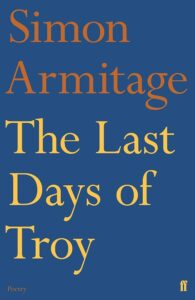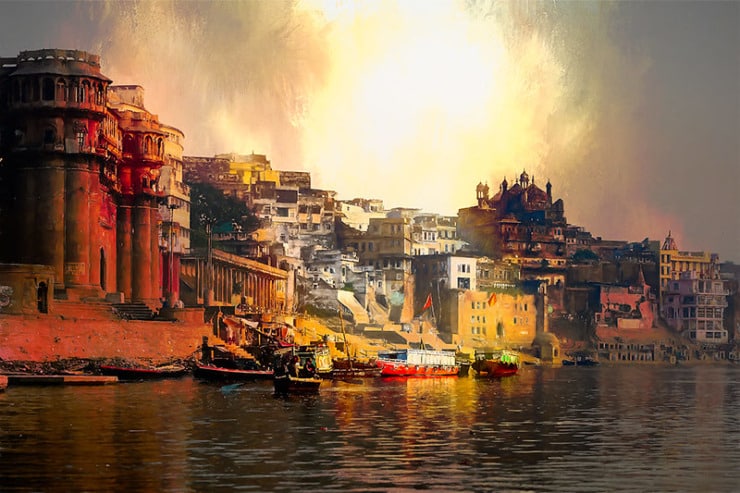 Simon Armitage turns an epic poem into a compelling play
Simon Armitage turns an epic poem into a compelling play
Britain’s poet laureate, Simon Armitage has long been interested in myth and legend. He has published retellings of Sir Gawain and the Green Knight, The Death of King Arthur, The Odyssey, and The Iliad, and reached into the mists of medieval England to translate two famous poems, The Owl and the Nightingale and Pearl. What do all of these works have in common? They were originally created in poetry, the common language of myth.
A few years ago, before he became poet laureate, his work with The Iliad led to the creation of a play, The Last Days of Troy. It was first performed at the Royal Exchange Theatre in Manchester before moving to Shakespeare’s Globe Theatre in London. Other productions have followed.
It’s a gripping piece of theater. It’s a gripping piece of writing in general. Armitage doesn’t “improve upon” Homer; it’s more that he illuminates the great Greek story for a contemporary audience.
It’s the last days of the great war, started 10 years previously when Paris of Troy kidnapped the beautiful Helen, wife of Menelaus, and brought her back to his city. Menelaus and his brother Agamemnon lead the Greek forces and besiege Troy. Two of Agamemnon’s ablest men are Odysseus and Achilles.

Simon Armitage
The war has reached a stalemate, and it’s wearing on the leaders of both sides. Any confidence of an assured victory has collapsed into bitterness, disillusion, and recriminations on both sides of the battle line. The gods play a role, too, of course, and it’s not an insignificant one. Thetis, mother of Achilles, naturally favors the Greeks. Athene favors the Trojans. Zeus leans one way and then the other, and his wife Hera snipes and belittles from the sidelines. In fact, as he recounts the backward and forward movements of armies, Zeus is portrayed more as a war correspondent than he is the chief of the gods.
It’s an altogether unsympathetic and even devious crowd all around, as told by Armitage, making for some enthralling scenes. Agamemnon is an ingrate, while Odysseus is shown to be conniving, determined to do whatever it takes to push the war to a Greek victory. The Trojans are just as conniving, political, and scheming.
Odysseus convinces Patroclus, the much-loved cousin of Achilles, to don Achilles’ armor and inspire the Greek soldiers. Patroclus is killed by Hector, the brother of Paris, who believes he’s slain Achilles. Achilles, who’s been sulking in his tent, is so enraged by the death of his cousin that he fights Hector and kills him. After the battle, Achilles rests, and the ghost of his cousin appears with these words:

You loved me in life but leave me now to rot.
Burn and bury me, friend. Until I’m buried
the spirits won’t open the House of the Dead;
I stalk the wrong side of the river, staring
across the rapids into its rooms and halls.
A last chance, Achilles, give me your warm hand.
Once I’ve passed through the curtain of flames
you’ll never see me or hear me again,
we’ll never touch, or walk on stony hillsides
scheming and gossiping, hatching our wild plans.
My fate from birth — to be killed at Troy
under its sloping walls — and your fate too.
So when you die, have them seal your bones
in a golden casket, wrapped with mine, so in death
we’ll be joined like brothers, as we were as boys.
Build a pyre; throw on a lock of your hair. Achilles …
At that moment, Achilles wakes, stands, and moves to embrace Patroclus, but the ghost has vanished. And Achilles, his rage spent with the death of Hector, gives in to grief and sorrow.
Imagine an entire play written with those kinds of riveting scenes. That’s The Last Days of Troy.
Named Britain poet laureate in 2019, Armitage has published several collections of poetry, including The Dead Sea Poems (1998), Kid (1999), Killing Time (1999), The Universal Home Doctor (2004), Book of Matches (2010), Seeing Stars (2011), The Shout (2014), Paper Aeroplane: Selected Poems 1989-2014 (2015), and The Unaccompanied (2017). He has written accounts of travels in Britain, including Walking Home: A Poet’s Journey (2013) and Walking Away (2016), and two novels, Little Green Man (2001) and White Stuff (2005).
Armitage has a gift for staying true to the old story while framing it in a contemporary way. These characters may be gods and kings, goddesses and princesses, but all of them show universal human frailties blended with the occasional moment of courage.
Related:
Simon Armitage Translates Pearl
Simon Armitage and “The Owl and the Nightingale”
The Audiobook preview of The Last Days of Troy
Photo by AjayGoel2011, Creative Commons, via Flickr. Post by Glynn Young.
How to Read a Poem uses images like the mouse, the hive, the switch (from the Billy Collins poem)—to guide readers into new ways of understanding poems. Anthology included.
“I require all our incoming poetry students—in the MFA I direct—to buy and read this book.”
—Jeanetta Calhoun Mish
- Poets and Fables: Steven Flint and “The Sun and the Boy” - July 3, 2025
- Poets and Poems: Alison Blevins and “Where Will We Live if the House Burns Down?” - July 1, 2025
- Poets and Poems: Paul Pastor and “The Locust Years” - June 26, 2025


Leave a Reply